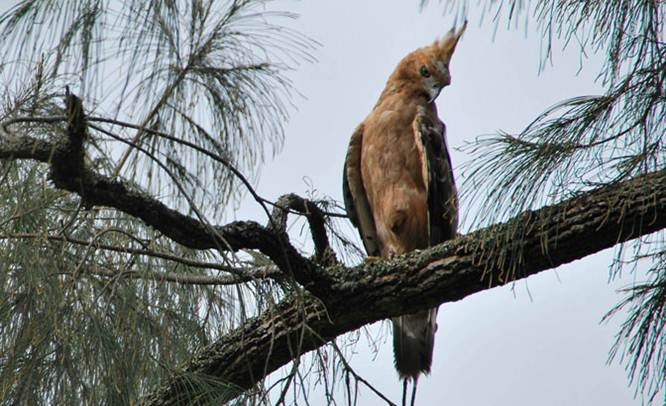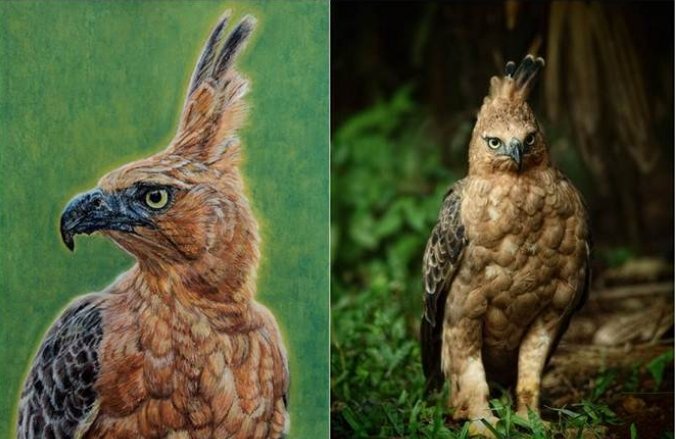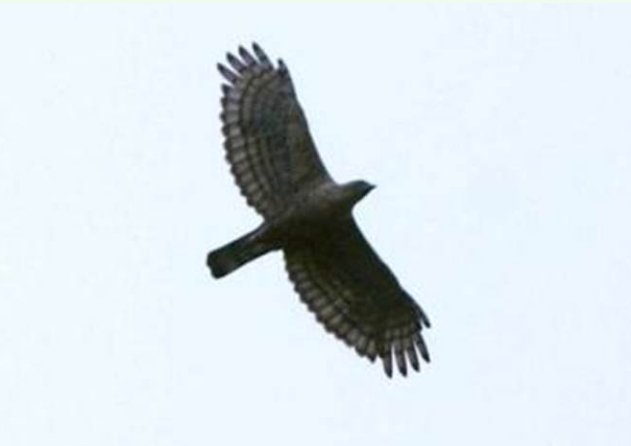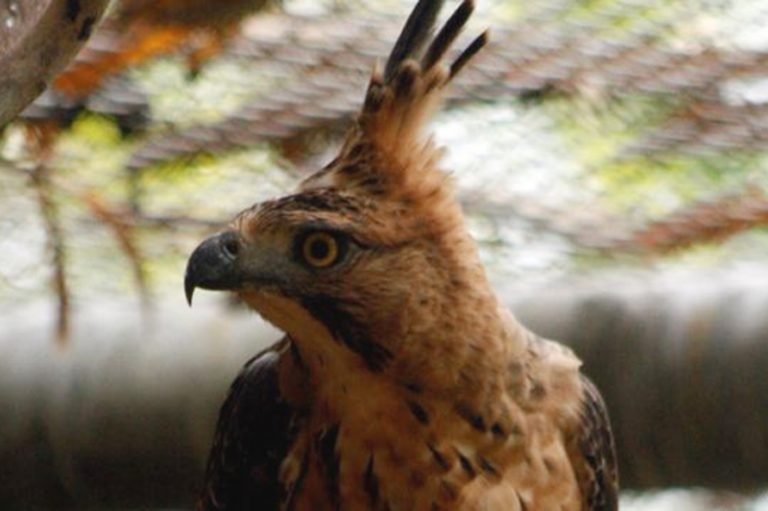Garuda birds that are known as the bird symbol of the Indonesian state actually refers to one of 16 species of eagle. Namely Javan Hawk or javan hawk-eagle (Nisaetus bartelsi alias Spizaetus bartelsi). Garuda is an endemic bird in Java Island. Javanese Eagle is among the most protected birds after its population in the wild has decreased sharply.
In 2010, the number of native alive birds recorded only 325 pairs, spread over Mount Halimun Salak, Gunung Gede Pangrango, Mount Ciremai, and several volcanoes in Java. At Mount Ceremai, for example, experts estimate that there are only five pairs left.
Picture of Garuda Bird / Java Eagle

This javan hawk bird since 1992 is designated as the mascot of the endangered species of Indonesia.
The physical characteristics of the eagle
This javanese eagle has a characteristic between a reddish-brown head, with a white-tipped black crest, consisting of 2-4 prominent feathers.
The neck is a yellowish brown, which sometimes looks golden glow when exposed to light.
The wings are slightly rounded with a slightly bent tip while flying.
The head is medium and proportional, the tail is slightly longer than the brontok eagle.

The population of Javan Hawk eagles is decreasing due to the rampant illegal hunting in the past to satisfy the rare animal collector. Prices of eagle high enough to attract the charmers to continue hunting.
To maintain its sustainability the International Trade Convention on Endangered Flora and Fauna incorporates Javanese eagles in Appendix 1. What does it mean? There should be extra strict regulations related to this animal trade. Through Presidential Decree No. 4 of 1993 on Animals and National Flowers, the Government of Indonesia confirmed Javanese eagles as representatives of aerial endangered animals. As for protecting this rare animal population, the Government has incorporated Javanese eagles in the bird list protected by the Act.
Appearance of an eagle while flying

Prices of eagle
For decades, these endangered species continue to be hunted by money-hungry humans who do not care for the preservation of endangered species. The hunters are generally special people who are ordered juragannya. If Javanese eagle has been obtained, the skipper will sell it to a rare animal collector with a high price.
That said, there is a foreign collector who had bargain price of eagle worth Rp 25 billion. A fantastic figure, indeed, but not comparable with the big losses experienced by this nation when the eagle of Java is truly destroyed from the earth.
Therefore, the management of Gunung Gede Pangrango National Park once closed the area of entry area in which the inhabitants of this Javanese eagle bird. The TNGGP also prohibits visitors from entering into the habitat of Javan Hawk eagles.
"To get into the TNGPP area, there are at least twenty two climbing routes. We only tolerate the three paths that climbers can enter. The three official channels that can be passed by visitors are through Cibodas (Cianjur), Salabintana (Sukabumi Regency), and Gunung Putri (Kabupaten Bogor), "said Agus Wahyudi.
Because it has 2 - 4 prominent crest, with a length of 12 cm, people in the area of Mount Gede Pangrango often call it a kuncung eagle. His style when flying similar to his close relative, brontok eagle (Spizaetus cirrhatus).
Garuda birds have a unique mating habit, which is done in a position of flying. So, the term is not eloped, but the marriage flies. With such marrying habits, can be understood if Javanese eagles can not be reared. With high levels of hunting, and its slow proliferation, the population continues to shrink year by year. What humans can do to increase their population is to increase oversight of illegal hunting, accompanied by the provision of conservation lands such as those done in TNGGP.
Efforts to release the eagle
Although there are some people who hunted him, not a few people who realize the smaller population of eagle birds. Once there was release of this bird in the hamlet Turgo, Purwobinangun Village, District Pakem, Sleman.
Here comes a story worth exemplifying by anyone, especially kicaumania who should know about birds that can be nurtured, and which birds are protected. Two years before, Khusnul Irawan (22), a Computer Science student living in Bintaran Wetan, Piyungan, Bantul, surfed a buying and selling site that offered Javanese eagles. Realizing the Javanese eagle is a protected bird, Irawan then buy it, only worth Rp 1.5 million.
The seller seems to be aware that he has committed an unlawful act. He was very careful when sending his payment procedure to Irawan. As a result, Irawan could not find out who the name of the seller was and where the syndicate operated. A few days after the bank transfer payment, the two-year-old Javanese eagle was sent through intercity bus delivery services. "My intentions to buy are indeed to be submitted. Once sent home, I contacted Taman Safari East Java, "said Irawan.
Unfortunately, no response from Taman Safari. He then sent an email to the same agency, but also no response. Finally he consulted the Natural Resource Conservation Center (BKSDA) DIY, and was told to take him there. Irawan who is aware that this bird is threatened with extinction, and is a protected bird, immediately meet the demand. Exactly two days after the bird was in his house. Soon, the birds were handed over to the Nature Conservation Foundation (WRC) Jogja.
It is this institution that then conducts rehabilitation and acclimatization in a cage in Dusun Turgo. It is important to train the wild instinct of the bird, so that later can be released into the wild. Two years duration of rehabilitation and acclimation, until the bird is released directly by the Governor of Yogyakarta Sri Sultan Hamengkubuwono X in Bukit Turgo, Pakem District, Sleman.
"I am happy to release the eagle to the wild. Hopefully, other residents will soon follow, handing birds protected to the government to be released into the wild, "said Irawan.

Sri Sultan welcomed positive efforts of the community in the conservation of Javan hawks and other wildlife. In fact, in particular he also said would hand over a number of birds that have been maintained at the Sultan Palace. Despite having the maintenance permit from the government, said Sri Sultan, wildlife remains better treated by conservation agencies. He hopes that the steps taken by Irawan and Yayasan Konservasi Alam Yogyakarta can be emulated by the community, not only in Yogyakarta but also throughout Indonesia.
Great bird. Good post.